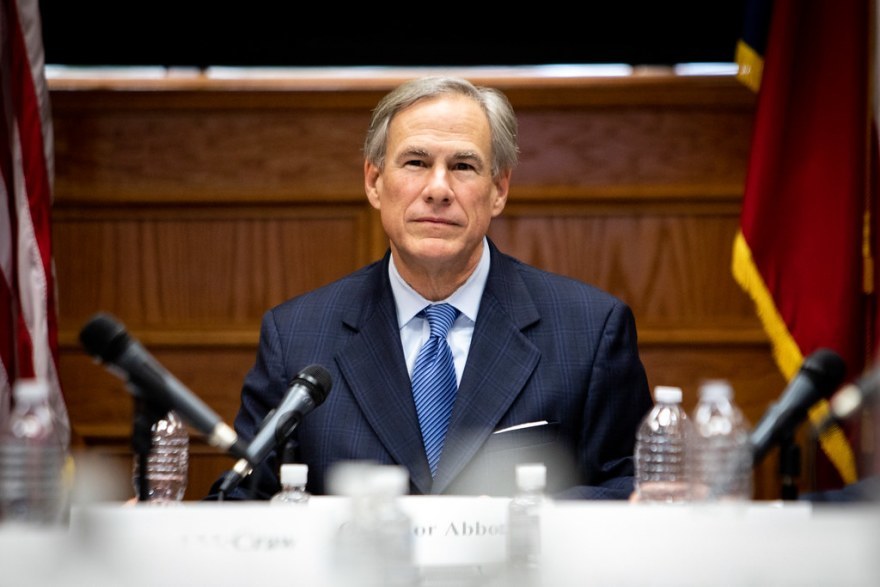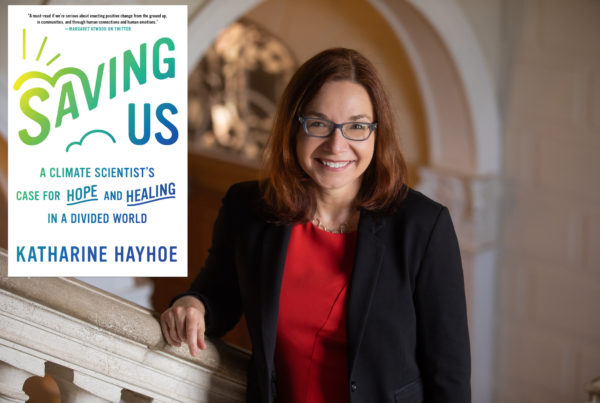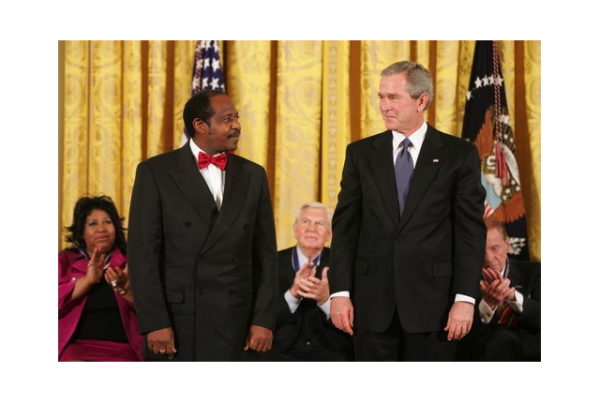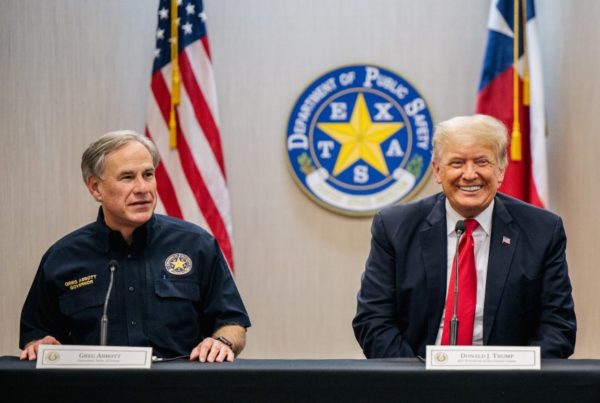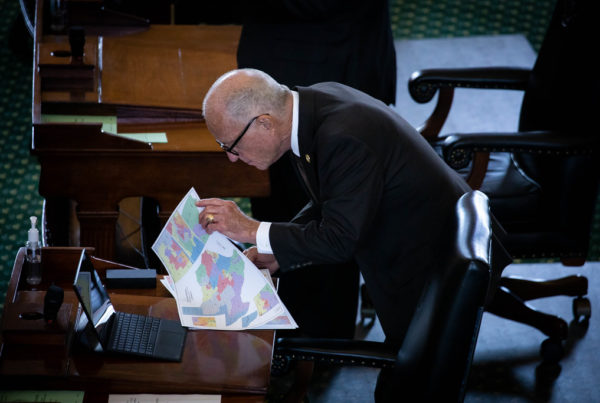From Texas Public Radio:
The Texas Republican Party believes its views are being silenced by big tech. The Republican-led legislature passed a bill that prevents so-called deplatforming, where users are banned from YouTube, Twitter and Facebook.
“Freedom of speech is under attack in Texas,” said Gov. Greg Abbott when he signed the bill into law earlier this month.
Now Texans, including the Attorney General, can sue social media companies who ban users for their political views. But — based on his own words — Abbott isn’t interested in protecting all voices and views.
“It is now law that conservative viewpoints in Texas cannot be banned on social media,” he said at the end of his video message announcing the law.
WATCH LIVE: Signing House Bill 20 into law, which protects Texans from wrongful social media censorship: https://t.co/VXu8pMPRPn #txlege
— Gov. Greg Abbott (@GovAbbott) September 9, 2021
The statements protecting the First Amendment have been increasingly at odds with the actions and legislation of elected Republican leaders. Texas Republicans officeholders have been notably aggressive this last year and legislative session in silencing other points of view.
The legislature passed a bill banning how teachers can talk about current events and systemic racism in the classroom. The so-called “” bill has been attacked by educators and historians who believe the state should be passing standards for educators, not scripts of what can and can’t be said.
“Once you start making prohibitions, and restricting the ability of the teacher to discuss — particularly things that that to many individuals and students and to their parents, may be controversial — I think that that’s getting into a dangerous area of censorship,” said Armando Alonzo, a professor of history at Texas A&M University.
The bill banning CRT wasn’t the only one concerned with how Texas and its history are talked about. The so-called 1836 Project would provide a patriotic history through official committee pamphlets.
“We must never forget why Texas became so exceptional in the first place. And law creating the 1836 project does that the 1836 Project promotes patriotic education about Texas,” said Abbott.
Historians like Alonzo argued the bill is an overreaction to the nation’s moves to highlight and address systemic racism. It derives its name from The New York Times’“1619 Project,” which charted the nation’s history from when the first slaves arrived in North America.
Alonzo said it will likely gloss over the negative parts of the state’s complex history — like the violent history of the Texas rangers at the border or the racist legislation passing for years in the Texas legislature. And forget the 100 years of Texas history that occurred before 1836.
And because the state is rolling out these pamphlets and determining what can’t be said in classrooms, rather than a private organization, the effort takes on a more sinister appearance.
“Unfortunately it resembles some of the dictatorships that, you know, that we are familiar with in the recent past where you have nation-states that only teach the history the way they want to teach it,” Alonzo said.
Chris Tomlinson recognizes what he sees in Texas. Before he was an author and columnist for the Houston Chronicle, he was an Army intelligence analyst during the Cold War.
“You know, the 1836 Project and all of these bills about what parts of Texas history are allowed and not allowed, come straight out of the Soviet Union,” he said.
Elected leaders have been aggressively trying to tamp down discussions about race in Texas history this past year, he said.
He finds it hypocritical when he hears the governor talk about conservative voices being silenced.
“Governor Abbott and Lieutenant Governor Dan Patrick oppressed my free speech when they canceled the book talk we had scheduled at the Bullock Museum, just three hours before we were to take the stage,” he said.
Tomlinson cowrote the book “Forget the Alamo.” It examines the role of maintaining slavery in the state’s battle for independence. The book challenges what he called the “white supremacist” legend of the Alamo Defenders motivations.
The lieutenant governor admitted he pressured the museum to cancel the book talk calling “Forget The Alamo” a rewriting of history. After a backlash, Patrick tried to organize a counter book talk that would include Tomlinson and his co-authors. Tomlinson called the event an attempt at a “Kangaroo Court,” where non-experts would try to impugn the authors’ work.
Texas demographics are changing fast, and soon Latinos will be the largest ethnic group. Tomlinson said these state leaders are trying to tap into the fear of that change to drive people to the polls.
An ad targeting those same voters was recently pulled from a University of Texas football game.
Anti-Trump-conservative activists The Lincoln Project bought a 60-second ad during the University of Texas vs Rice University game, airing nationally on the Longhorn Network. The game was a blowout 58-0 for the Longhorns, but the ad, called “Abbott’s Wall” never aired.
In emails provided by the Lincoln Project, it appeared the ad was purchased, scrutinized by ESPN (a co-owner of the Longhorn Network) and approved to air.
The ad featured a row of caskets set on their ends like a wall as a ticker counted off 60,000 Texans dead from COVID, criticizing Abbott’s handling of the pandemic. Abbott has been fighting cities, counties and school districts over their attempts to prevent the spread of the disease.
Lincoln Project co-founder Reed Galen said they found out about 10 minutes before kickoff that it had been pulled by the university, which also co-owns the network.
Galen said he thought the governor — who appointed the University’s Board of Regents — had it pulled.
“It’s just highly convenient that an ad that is disparaging and highlighting of his failure, suddenly… somehow disappears from the air,” Galen said.
The governor’s office referred TPR’s questions about the issue to the governor’s campaign, which flatly denied allegations they had anything to do with the ad being pulled.
University of Texas officials have not responded to multiple emails from TPR. But in a recording of a faculty council meeting Provost Sharon Wood said the ad was pulled Friday by the company Learfield which handles all national ad placements for the network.
“For over a decade, Learfield has followed a standing policy of not selling political advertisements other than candidate-backed ads. And it is our understanding that Learfield pulled this particular advertisement on Friday evening, which is consistent with this long standing policy,” Wood said.
Wood did not explain why the ad was sold to begin with. Her office did not respond to follow up questions. Learfield did not respond to TPR questions, including a request of the policy the ad violated.
Regardless of what happened with this one ad, it may be true that freedom of speech is under attack in Texas, just not from the people the governor says.


